Excavation Contractors Finderne
Find the best Excavation Contractor in Finderne
Get up to 3 Trenching Services quotes for your project today! Compare profiles, reviews, accreditations, portfolio, etc... and choose the best deal.
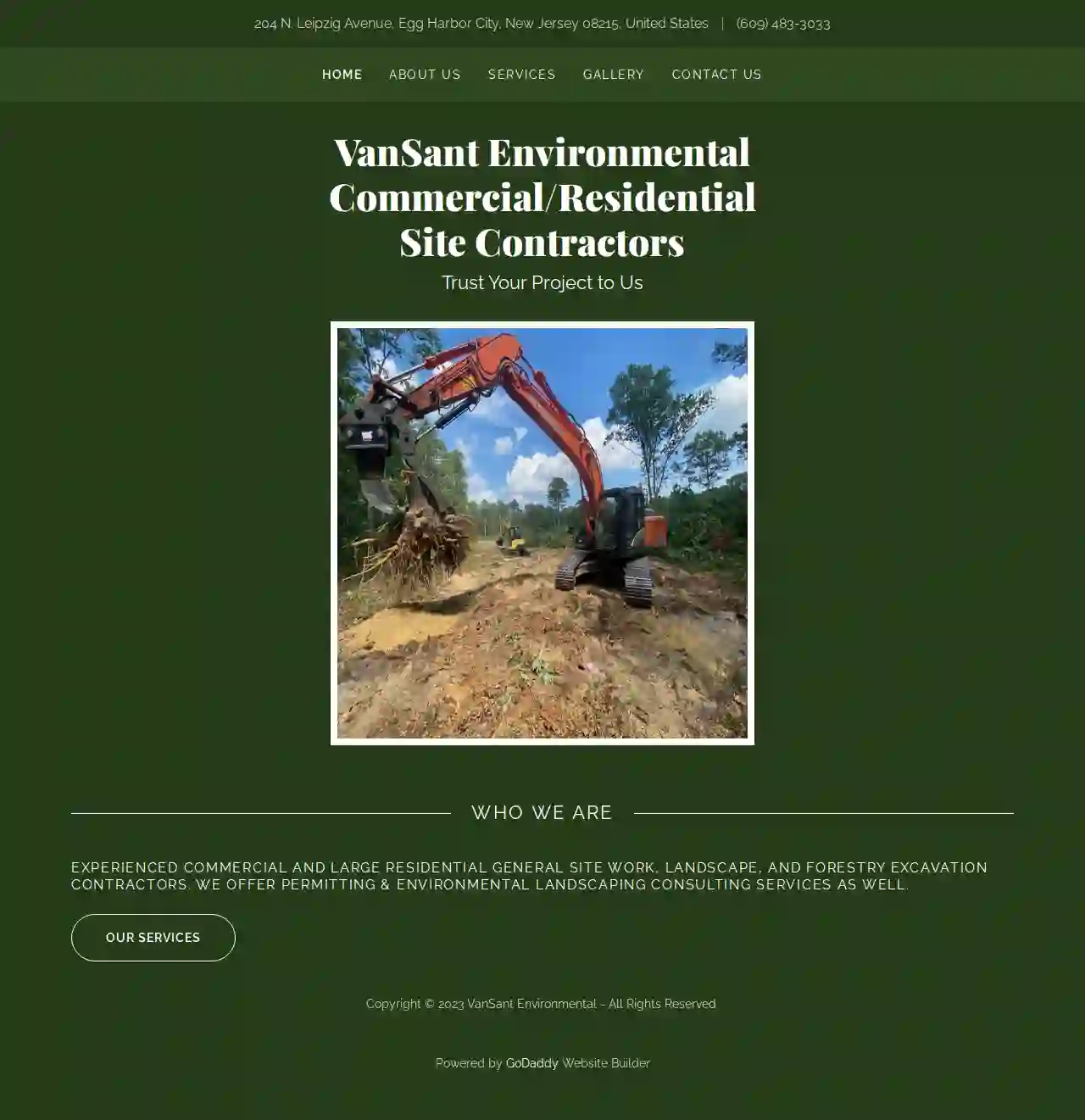
VanSant Environmental Landscaping & Site Work
51 reviews204 North Leipzig Avenue, Galloway, 08215, USWho We Are Experienced Commercial and LARGE Residential General Site work, Landscape, and Forestry EXCAVATION Contractors. We offer permitting & environmental landscaping consulting services as well. Our Team Barry VanSant Barry is the owner and the company's Horticulturist and Landscape Designer/Consultant. He has over 45 years experience in multiple areas of the industry. Samuel VanSant Sam is the company's Project and Construction Manager. He oversees the day-to-day operations and all heavy equipment operations. Adam Wolff Adam is our field engineer. He is a graduate of East Carolina University in construction management and LEED Certified. Frequently Asked Questions Are you insured and licensed? We have all necessary licenses for our area, and we carry insurance for all of our projects. What kind of landscaping do you do? Our specialty is in natural and native plant material and methods that fit the ecology of our area. We proudly support and volunteer for: Team Rubicon USA Volunteer Partner Since Oct. 2016 Habitat For Humanity Volunteer Partner Since Oct. 2016 U.S. Fish and Wildlife Services Volunteer Partner Since Dec. 2018
- Services
- Why Us?
- Our Team
- Gallery
Get Quote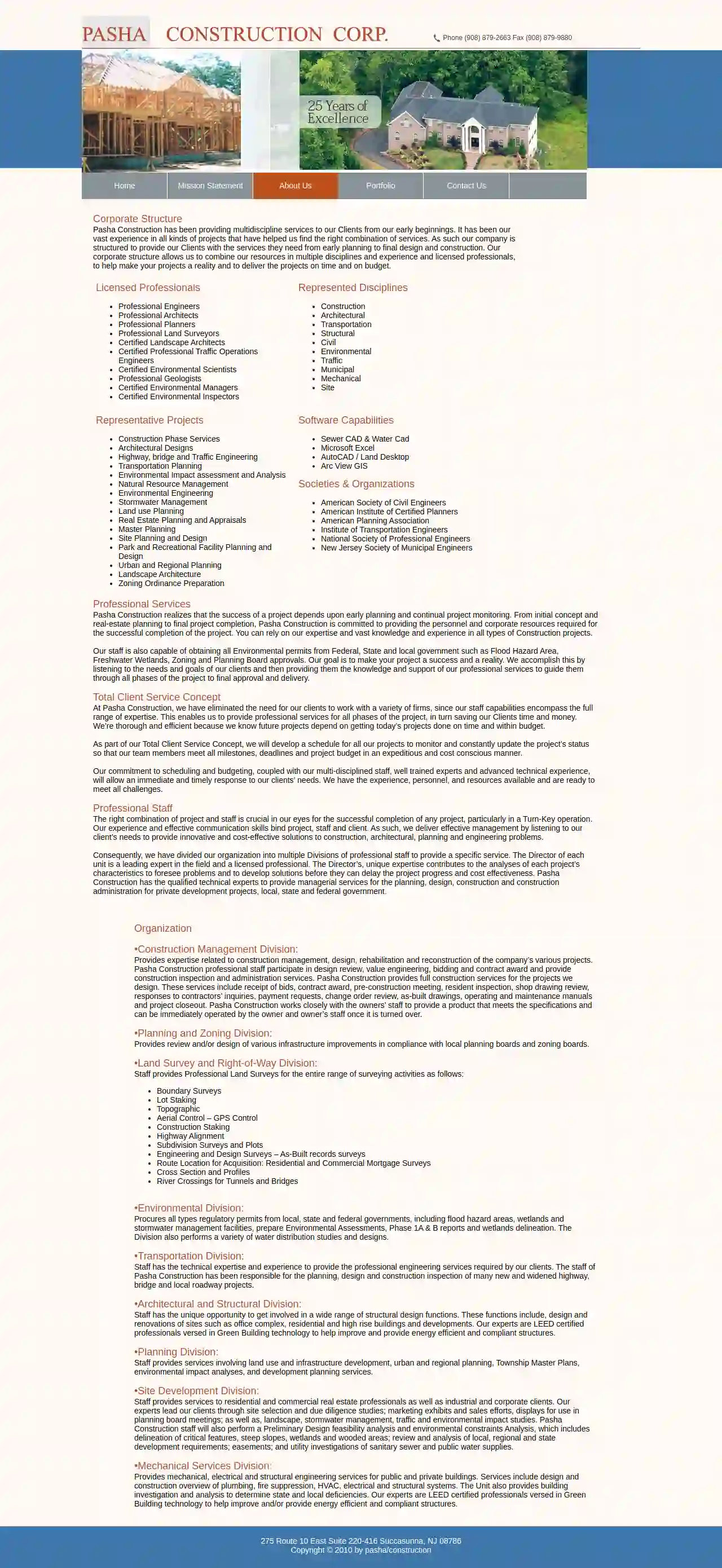
Pasha Construction
275 Route 10 East Suite 220-416, Succasunna, 08786, USAbout Us Pasha Construction has been providing multidiscipline services to our Clients from our early beginnings. It has been our vast experience in all kinds of projects that have helped us find the right combination of services. As such our company is structured to provide our Clients with the services they need from early planning to final design and construction. Our corporate structure allows us to combine our resources in multiple disciplines and experience and licensed professionals, to help make your projects a reality and to deliver the projects on time and on budget. Licensed Professionals Professional Engineers Professional Architects Professional Planners Professional Land Surveyors Certified Landscape Architects Certified Professional Traffic Operations Engineers Certified Environmental Scientists Professional Geologists Certified Environmental Managers Certified Environmental Inspectors Represented Disciplines Construction Architectural Transportation Structural Civil Environmental Traffic Municipal Mechanical Site Representative Projects Construction Phase Services Architectural Designs Highway, bridge and Traffic Engineering Transportation Planning Environmental Impact assessment and Analysis Natural Resource Management Environmental Engineering Stormwater Management Land use Planning Real Estate Planning and Appraisals Master Planning Site Planning and Design Park and Recreational Facility Planning and Design Urban and Regional Planning Landscape Architecture Zoning Ordinance Preparation Software Capabilities Sewer CAD & Water Cad Microsoft Excel AutoCAD / Land Desktop Arc View GIS Societies & Organizations American Society of Civil Engineers American Institute of Certified Planners American Planning Association Institute of Transportation Engineers National Society of Professional Engineers New Jersey Society of Municipal Engineers Professional Services Pasha Construction realizes that the success of a project depends upon early planning and continual project monitoring. From initial concept and real-estate planning to final project completion, Pasha Construction is committed to providing the personnel and corporate resources required for the successful completion of the project. You can rely on our expertise and vast knowledge and experience in all types of Construction projects. Our staff is also capable of obtaining all Environmental permits from Federal, State and local government such as Flood Hazard Area, Freshwater Wetlands, Zoning and Planning Board approvals. Our goal is to make your project a success and a reality. We accomplish this by listening to the needs and goals of our clients and then providing them the knowledge and support of our professional services to guide them through all phases of the project to final approval and delivery. Total Client Service Concept At Pasha Construction, we have eliminated the need for our clients to work with a variety of firms, since our staff capabilities encompass the full range of expertise. This enables us to provide professional services for all phases of the project, in turn saving our Clients time and money. We’re thorough and efficient because we know future projects depend on getting today’s projects done on time and within budget. As part of our Total Client Service Concept, we will develop a schedule for all our projects to monitor and constantly update the project’s status so that our team members meet all milestones, deadlines and project budget in an expeditious and cost conscious manner. Our commitment to scheduling and budgeting, coupled with our multi-disciplined staff, well trained experts and advanced technical experience, will allow an immediate and timely response to our clients’ needs. We have the experience, personnel, and resources available and are ready to meet all challenges.
- Services
- Why Us?
- Gallery
Get Quote
Roy Anderson Corp
4.128 reviews11400 Reichold Road, Gulfport, 39503, USAbout Roy Anderson Corp Roy Anderson Corp is an innovative construction company with unique strengths, committed to delivering unsurpassed customer service and performance to customers, creating exciting opportunities for associates and bound together by shared core beliefs of safety, quality and integrity. Since 1955 Roy Anderson Corp has delivered exceptional construction services including Preconstruction, Design-Build, General Contracting and Construction Management. We are a wholly owned subsidiary of Tutor Perini Corporation (NYSE: TPC) who is consistently ranked among the top builders in the United States by Engineering News Record.
- Services
- Why Us?
- Gallery
Get Quote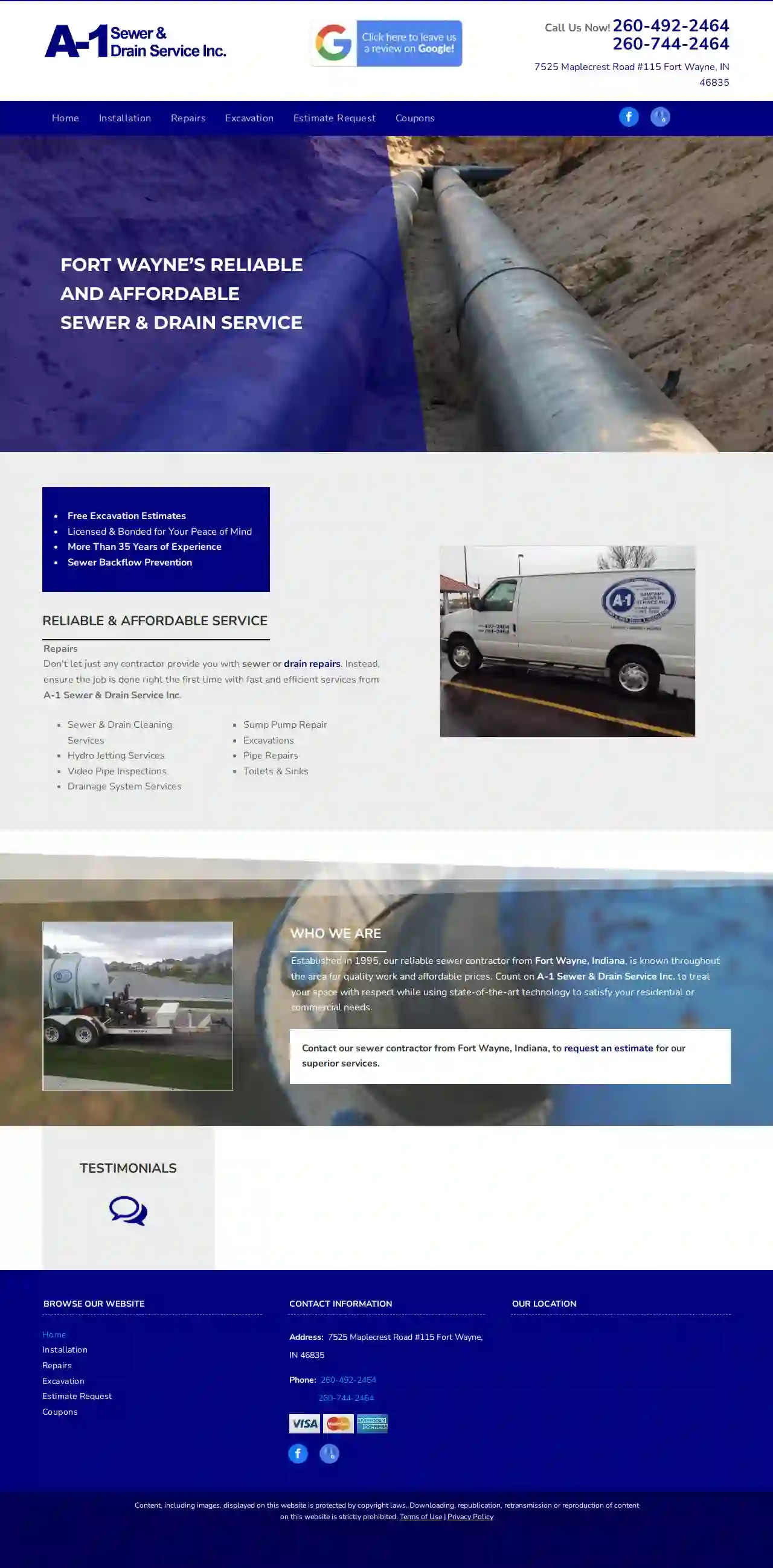
A-1 Sanitary Sewer & Drain Services
4.778 reviews7525 Maplecrest Road, #115, 7525 Maplecrest Road #115, Fort Wayne, 46835, USFORT WAYNE’S RELIABLE AND AFFORDABLE SEWER & DRAIN SERVICE A-1 Sewer & Drain Service Inc. is a trusted sewer and drain contractor serving Fort Wayne, Indiana. Established in 1995, we have over 35 years of experience providing quality services at affordable prices. We are committed to treating your space with respect and using state-of-the-art technology to meet your residential or commercial needs. We are licensed and bonded for your peace of mind. Contact us today for a free excavation estimate.
- Services
- Why Us?
- Testimonials
- Gallery
Get Quote
Dirt Dynasty LLC
54 reviewsBridgewater, New Jersey, USWelcome to Dirt Dynasty, where our foundation is built on the very grounds we work with. Established in recent years by a team of ambitious professionals, we've quickly risen through the ranks to carve our niche in the excavation and masonry service industry. Our journey began when our founders, armed with years of invaluable experience and a vision of independence, decided it was time to stop working under others and instead, build their own legacy. Thus, Dirt Dynasty was born. At Dirt Dynasty, we specialize in a wide array of services designed to meet the diverse needs of both businesses and homeowners alike. Our expertise spans trenching, creating your dream pools and ponds, installing septic tanks, oil tank removals, and the careful demolition of structures. But our craftsmanship doesn’t end there; we also excel in constructing durable retaining walls, crafting picturesque outdoor patios, and setting up functional outdoor kitchens that become the heart of your backyard gatherings. Understanding the needs of our clients extends beyond just the services we offer. We also provide material deliveries including clean stone, fill, mulch, pond rocks, and more, ensuring that your projects have the high-quality materials they require, delivered right to your doorstep. What sets Dirt Dynasty apart is not just our comprehensive service offerings, but our unwavering commitment to satisfaction. We believe in building relationships that go beyond the transaction. Every project we undertake is a testament to our dedication to excellence, attention to detail, and the respect we hold for your vision and space. We strive to not only meet your expectations but exceed them, ensuring that every interaction with us is as seamless and positive as possible. Even if you don’t have an immediate need for our services, we invite you to reach out. Let's lay the groundwork for a future project, discuss your ideas, or simply get to know each other better. At Dirt Dynasty, we believe in fostering connections that might not bear immediate fruit but will grow into strong, supportive relationships over time. Thank you for considering Dirt Dynasty for your excavation and masonry needs. We look forward to the opportunity to work with you and to add your project to the legacy of our dynasty.
- Services
- Why Us?
- Gallery
Get Quote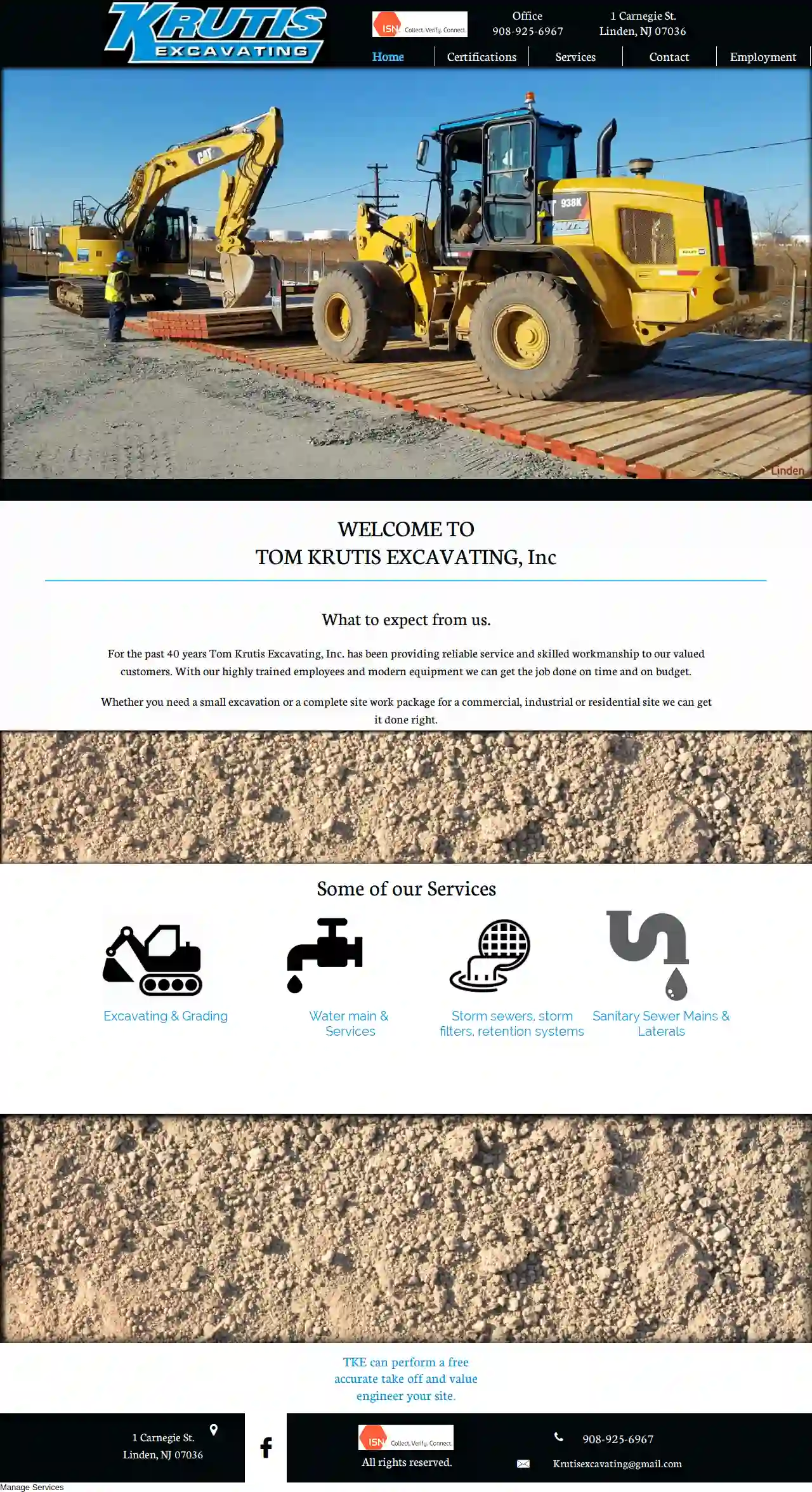
Tom Krutis Excavating Inc
4.612 reviews123 Main Street, Cityville, 12345, USKruti Excavating: Your Trusted Partner for Excavation Services Kruti Excavating is a reputable and experienced excavation company serving the [CITY] area. We are committed to providing high-quality services at competitive prices. Our team of skilled professionals is dedicated to delivering exceptional results on every project, no matter how big or small. We understand that excavation projects can be complex and require careful planning and execution. That's why we take a personalized approach to every job, working closely with our clients to ensure their needs are met. From site preparation to utility installation, we handle all aspects of your excavation project with precision and efficiency. At Kruti Excavating, we are committed to safety and environmental responsibility. We use the latest equipment and techniques to minimize disruption and ensure a clean and safe work environment. Our goal is to exceed your expectations and deliver a project that you can be proud of.
- Services
- Why Us?
- Testimonials
Get Quote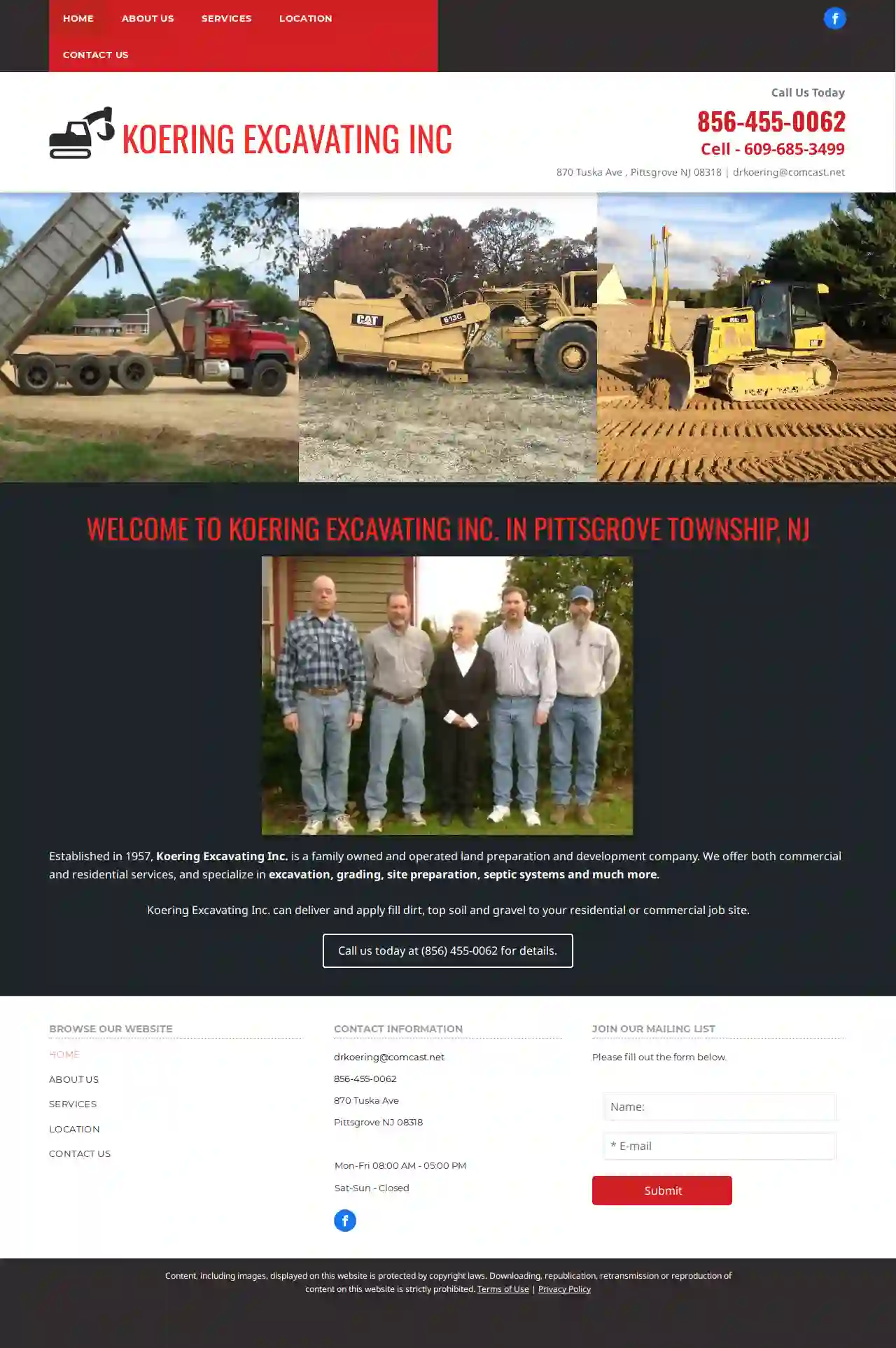
Koering Excavating Inc.
870 Tuska Ave, Pittsgrove, 08318, USAbout Koering Excavating Inc. Established in 1957, Koering Excavating Inc. is a family-owned and operated land preparation and development company. We take pride in our 59 years of service to the greater Pittsgrove Township area. With an eye for detail and our focus on safety, we offer our services to our residential, commercial, and municipal community. We have the industry experience and equipment to get the job done safely and on time the first time. We offer both commercial and residential services, and specialize in excavation, grading, site preparation, septic systems, and much more. Koering Excavating Inc. can deliver and apply fill dirt, top soil, and gravel to your residential or commercial job site. Our Heavy Duty Equipment Includes: Front End Loader Bull Dozier Dump Truck Back Hoe Excavator Plainer
- Services
- Why Us?
- Gallery
Get Quote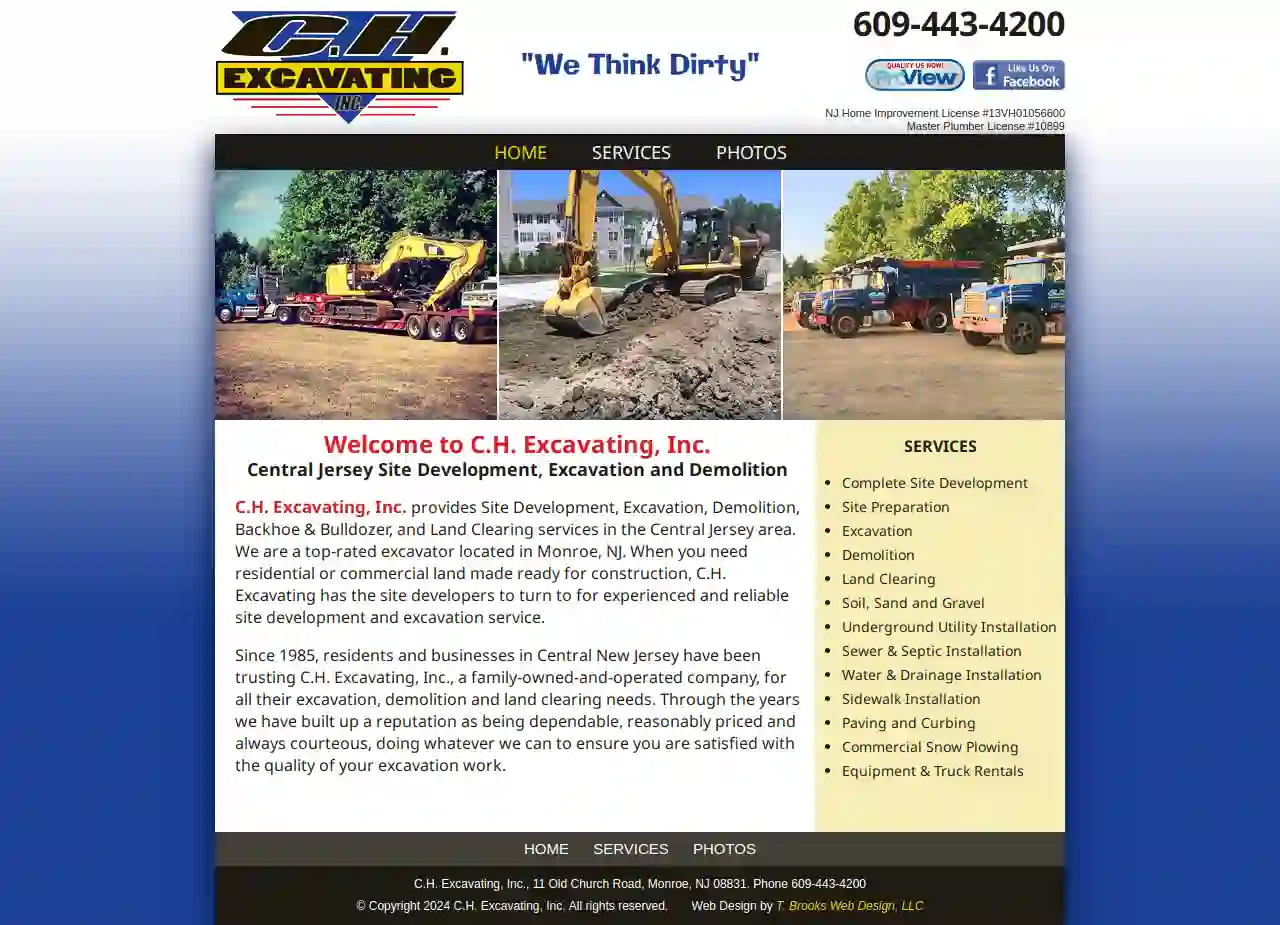
C H Excavating Contractors Inc
53 reviews11 Old Church Road, Monroe, 08831, USWelcome to C.H. Excavating, Inc. Central Jersey Site Development, Excavation and Demolition C.H. Excavating, Inc. provides Site Development, Excavation, Demolition, Backhoe & Bulldozer, and Land Clearing services in the Central Jersey area. We are a top-rated excavator located in Monroe, NJ. When you need residential or commercial land made ready for construction, C.H. Excavating has the site developers to turn to for experienced and reliable site development and excavation service. Since 1985, residents and businesses in Central New Jersey have been trusting C.H. Excavating, Inc., a family-owned-and-operated company, for all their excavation, demolition and land clearing needs. Through the years we have built up a reputation as being dependable, reasonably priced and always courteous, doing whatever we can to ensure you are satisfied with the quality of your excavation work.
- Services
- Why Us?
- Gallery
Get Quote
Founders Contracting - Directional Drilling Company
Wayne, USiPage is a leading provider of web hosting and domain name services for both individuals and businesses. We offer a wide range of hosting plans to suit your needs, from basic shared hosting to powerful VPS and dedicated servers. Our services are designed to help you build and grow your online presence, with features like easy-to-use website builders, one-click installs for popular applications, and 24/7 customer support. We are committed to providing our customers with the best possible experience, and we are constantly innovating to improve our services. We are also proud to be a green company, committed to reducing our environmental impact. We believe in providing our customers with the best possible value, and we offer a variety of affordable hosting plans to fit your budget. We are confident that you will be satisfied with our services, and we encourage you to try us out today.
- Services
- Why Us?
- Gallery
Get Quote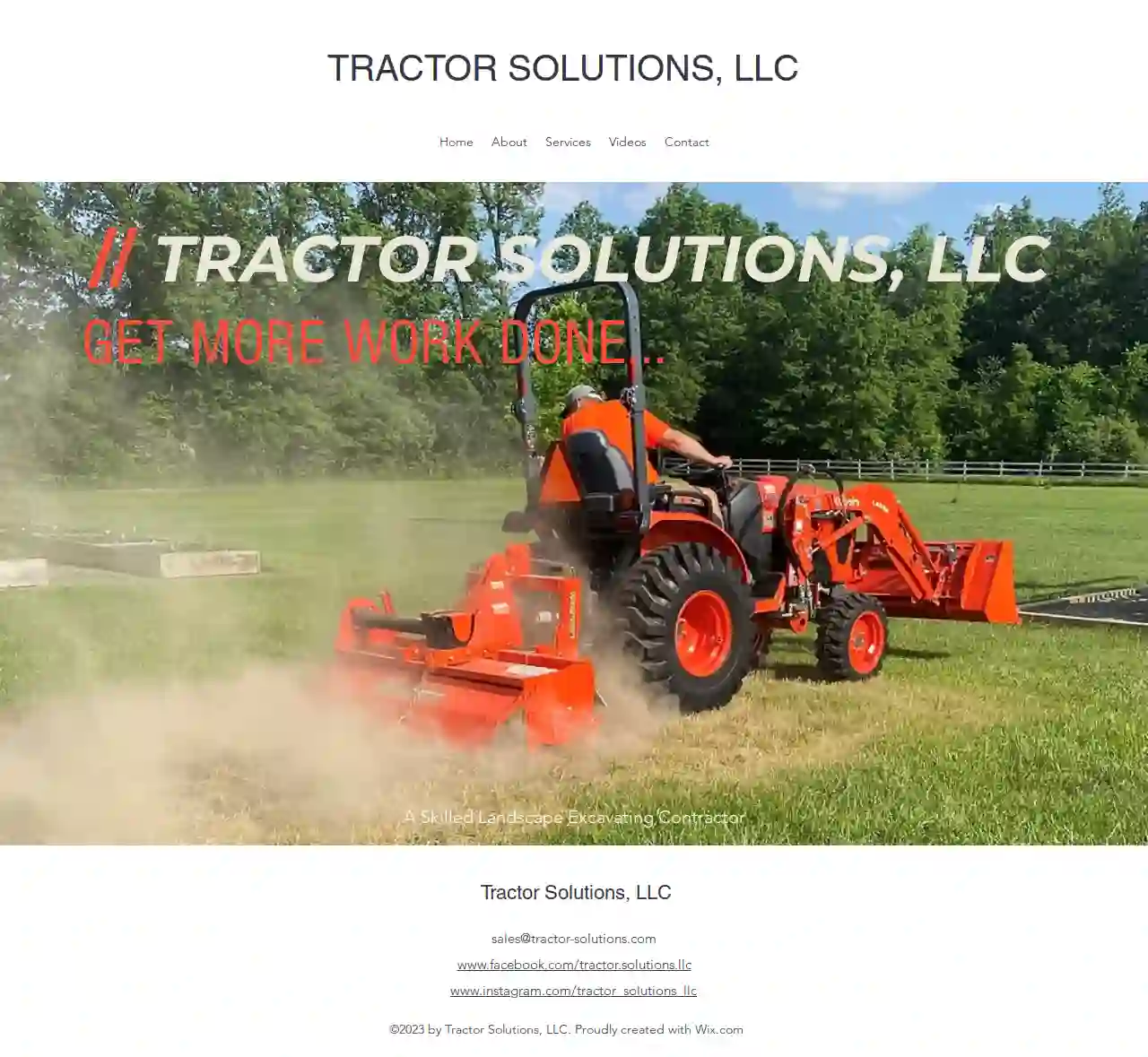
Tractor Solutions, LLC
Wayne, USGet More Work Done... Tractor Solutions, LLC is a skilled landscape excavating contractor dedicated to providing high-quality services and exceeding client expectations. We understand the importance of efficiency and effectiveness in your projects, and we strive to deliver results that meet your specific needs.
- Services
- Why Us?
- Gallery
Get Quote
Over 22,076+ Excavation Contractors on our directory
Our excavation companies operate in Finderne & beyond!
ExcavationHQ has curated and vetted Top Excavation Contractors near Finderne. Find a top & reliable contractor today.
Frequently Asked Questions About Excavation Contractors
- Topsoil Removal: Stripping the fertile topsoil layer from a site, often preserving it for landscaping.
- Trench Excavation: Digging long, narrow trenches for utilities (pipes, cables) or foundations.
- Basement Excavation: Removing earth to create a space for a basement beneath a structure.
- Pool Excavation: Digging a precise hole for installing a swimming pool.
- Roadway Excavation: Removing earth and preparing the ground for road construction.
- Demolition Excavation: Clearing debris and preparing the site after demolition.
- Channel Excavation: Creating channels for drainage or irrigation.
- Trench Collapses: Unstable trench walls can cave in, posing a severe risk to workers. Proper shoring and sloping are crucial safety measures.
- Utility Damage: Striking underground utilities (gas, water, electric) can cause leaks, explosions, or electrocution. Accurate utility locates and careful digging are essential.
- Falling Objects: Materials or equipment falling into excavations can injure workers. Securing work areas and using appropriate safety gear is vital.
- Equipment Accidents: Operating heavy machinery involves risks of rollovers, collisions, or mechanical failures. Trained operators and proper equipment maintenance are critical.
- Environmental Hazards: Excavated soil might contain hazardous materials (asbestos, lead). Proper testing and disposal procedures are necessary.
- Mechanical Excavation: Utilizing heavy equipment like excavators, backhoes, bulldozers, and loaders, suitable for most projects.
- Hand Excavation: Using hand tools (shovels, picks) for smaller excavations or delicate work near utilities.
- Blasting: Employing explosives to break up rock or hard materials, typically for large-scale projects.
- Hydro Excavation: Using high-pressure water jets to loosen and remove soil, often used for locating utilities or delicate excavation.
- Vacuum Excavation: Employing a vacuum system to suck up excavated material, suitable for safe excavation near utilities or in confined spaces.
- Determine the Area: Measure the length and width of the area you want to fill. Multiply them to get the area in square feet (or meters).
- Determine the Depth: Measure the difference between the existing grade and the desired grade (how much you need to raise the ground). This is the depth of fill required.
- Calculate Volume: Multiply the area (step 1) by the depth (step 2) to get the volume in cubic feet (or meters).
- Account for Compaction: Fill dirt compacts when it settles, so add 10% to 25% to the calculated volume to account for compaction. The exact percentage depends on the type of fill material.
What are the different types of excavation?
What are the risks associated with excavation?
What are the different methods of excavation?
How do I calculate how much dirt I need for fill?
What are the different types of excavation?
- Topsoil Removal: Stripping the fertile topsoil layer from a site, often preserving it for landscaping.
- Trench Excavation: Digging long, narrow trenches for utilities (pipes, cables) or foundations.
- Basement Excavation: Removing earth to create a space for a basement beneath a structure.
- Pool Excavation: Digging a precise hole for installing a swimming pool.
- Roadway Excavation: Removing earth and preparing the ground for road construction.
- Demolition Excavation: Clearing debris and preparing the site after demolition.
- Channel Excavation: Creating channels for drainage or irrigation.
What are the risks associated with excavation?
- Trench Collapses: Unstable trench walls can cave in, posing a severe risk to workers. Proper shoring and sloping are crucial safety measures.
- Utility Damage: Striking underground utilities (gas, water, electric) can cause leaks, explosions, or electrocution. Accurate utility locates and careful digging are essential.
- Falling Objects: Materials or equipment falling into excavations can injure workers. Securing work areas and using appropriate safety gear is vital.
- Equipment Accidents: Operating heavy machinery involves risks of rollovers, collisions, or mechanical failures. Trained operators and proper equipment maintenance are critical.
- Environmental Hazards: Excavated soil might contain hazardous materials (asbestos, lead). Proper testing and disposal procedures are necessary.
What are the different methods of excavation?
- Mechanical Excavation: Utilizing heavy equipment like excavators, backhoes, bulldozers, and loaders, suitable for most projects.
- Hand Excavation: Using hand tools (shovels, picks) for smaller excavations or delicate work near utilities.
- Blasting: Employing explosives to break up rock or hard materials, typically for large-scale projects.
- Hydro Excavation: Using high-pressure water jets to loosen and remove soil, often used for locating utilities or delicate excavation.
- Vacuum Excavation: Employing a vacuum system to suck up excavated material, suitable for safe excavation near utilities or in confined spaces.
How do I calculate how much dirt I need for fill?
- Determine the Area: Measure the length and width of the area you want to fill. Multiply them to get the area in square feet (or meters).
- Determine the Depth: Measure the difference between the existing grade and the desired grade (how much you need to raise the ground). This is the depth of fill required.
- Calculate Volume: Multiply the area (step 1) by the depth (step 2) to get the volume in cubic feet (or meters).
- Account for Compaction: Fill dirt compacts when it settles, so add 10% to 25% to the calculated volume to account for compaction. The exact percentage depends on the type of fill material.